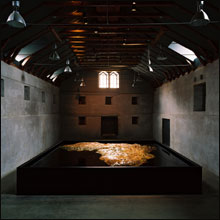A conversation with Alfredo Jaar
By IAN PAIGE | December 12, 2007

EMERGENCIA: Africa rises and falls in a pool
of dark water. |
Chilean-born and New York-based artist Alfredo Jaar spoke last week at the University of Southern Maine campus as part of the Nelson Fund for Social Justice project at the Portland Museum of Art. He spoke about his process creating public interventions, walking the audience through one of his best known projects, one concerning the genocide in Rwanda. He sat down with the Portland Phoenix to further discuss his practice.You’ve described your art as having a goal of elevating consciousness. What does that mean to you?
I’ve always thought that artists are very privileged individuals. That privilege comes from responsibility. Basically, society has given us the time and the resources to think. That’s what I do. I think. I think about the world. I think about society. I think about the way we could make things better. The world of culture is a great way to do that. Maybe, the world of culture is the last open and free space where you can do that.
I try to first inform about a particular situation. That information I offer to the audience through emotions. Information through emotions. I want to move you. I feel incapable of creating a work that is a pure product of my imagination. Everything I’ve done for the last thirty years responds of to a real-life event. I’m not a studio artist; I am a project artist. All these works are projects which develop according to their logic. Ideally, I want the audience to feel connected to the subject. We have to find strategies to connect because people feel removed from these issues.
What is perhaps your ideal elevation of art?
From which you learn about the world in which you live. Each project will have its different objectives. In some works, it will move you to action. The audience reaches a point of information and they go out on their own.
Do you consider your work direct action?
As human beings, in this country, we live a very distanced life from other events. It’s almost a world of fiction. A very privileged world which doesn’t correspond to more than 10 or 15 percent of the rest of the world. Once you get out of here you discover that. I’m trying to bridge these worlds and create awareness that it is all one world. We are all human beings.
In what ways does your work engage the mechanisms of society — socialism, capitalism?
Sometimes it is direct, sometimes it is implied in my work, but it is always there, because there is no outside the system. We participate fully in that system, we have clothes, we have heat, we have projection systems, technology for the museums. I accept that system, but I demand that we are aware that we are within that system. I am always looking for the little cracks because I want to create a sense of balance between reality and that system. The system tries to make you forget reality. That’s what happened with Rwanda because Rwanda was not able to create even a crack in the consciousness of this country so you have Newsweek magazine that for seventeen weeks ignored the killing of one million people. What is it doing by doing that? It is saying that we have to protect the system, the system works fine without paying attention to this. As artists we are looking for these cracks to enter the system in order to say this is part of our world.
 Related
Related:
Because the world is flat … or something, Diamonds in the rough, Peaks Island veteran collects stories of war's atrocities, More 
- Because the world is flat … or something
United Nations Human Rights Council debuts, sucks.
- Diamonds in the rough
In 1941, 27-year-old Polish Jew Meyer Hack was deported to Auschwitz along with his mother, two sisters, and brother.
- Peaks Island veteran collects stories of war's atrocities
Thirty-six years ago, more than 100 Vietnam veterans gathered in Detroit to describe and expose war crimes perpetrated by themselves and their fellow soldiers.
- Letters to the Portland editor: July 6, 2007
It is not easy being a US citizen with a conscience.
- Goodbye, cruel America
Toward the end of 2006, we woke up to the glad news that Chile’s former strongman Augusto Pinochet had saved everyone the trouble of hanging his sickly carcass for war crimes and atrocities by dying of a heart attack.
- God Grew Tired of Us
Back in the ’80s, long before Darfur became a word linked with genocide in the Western media, the Islamic north waged a bloody campaign against the Christian farmers. Before there was darfur: Around the world. By Tom Meek.
- Beyond the Gates
As the end credits roll on Michael Caton-Jones’s film, the latest to deal with the Rwandan genocide, it’s hard not to tear up.
- Spring loaded
It’s spring, and Hollywood has to get the kinks out of its system before it can focus on the business at hand: the sequels of summer.
- Taking sides
Have you been remiss in taking a stand on the killing war in Darfur because the situation there seems too complex to understand?
- Faces of conflict
Each summer, it seems, the Iraq War springs another issue for the peace movement to rally around, symbolized by a specific face with a story to tell.
- Ordure in the court
“He couldn’t be a terrorist, living in a cellar and eating canned food,” says a perceptive friend of the notorious French attorney Jacques Vergès.
- Less

 Topics
Topics:
Museum And Gallery
, Crime, War Crimes, Genocide, More  , Crime, War Crimes, Genocide, University of Southern Maine, Portland Museum of Art, Less
, Crime, War Crimes, Genocide, University of Southern Maine, Portland Museum of Art, Less 